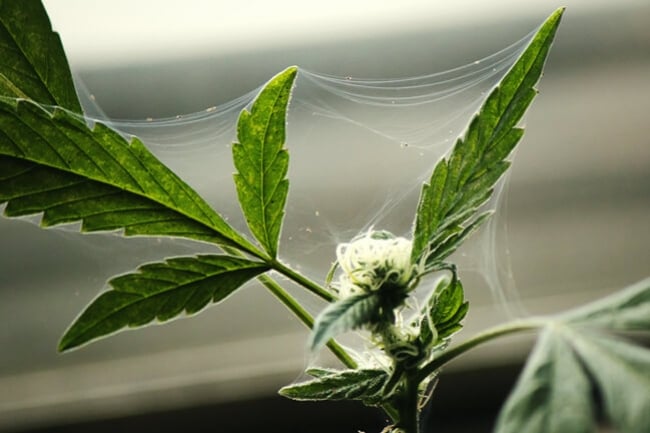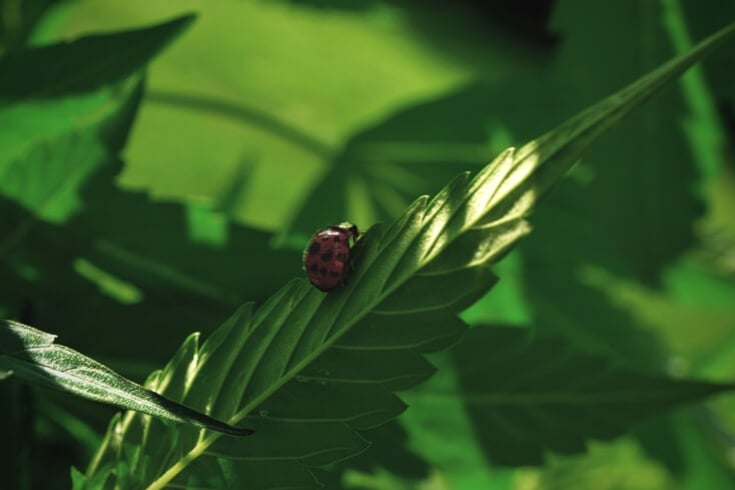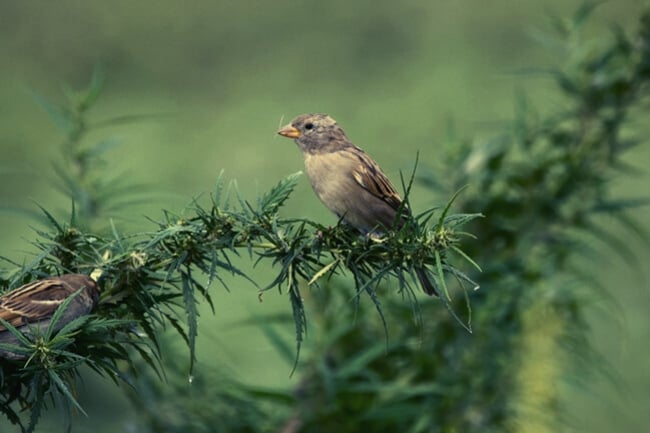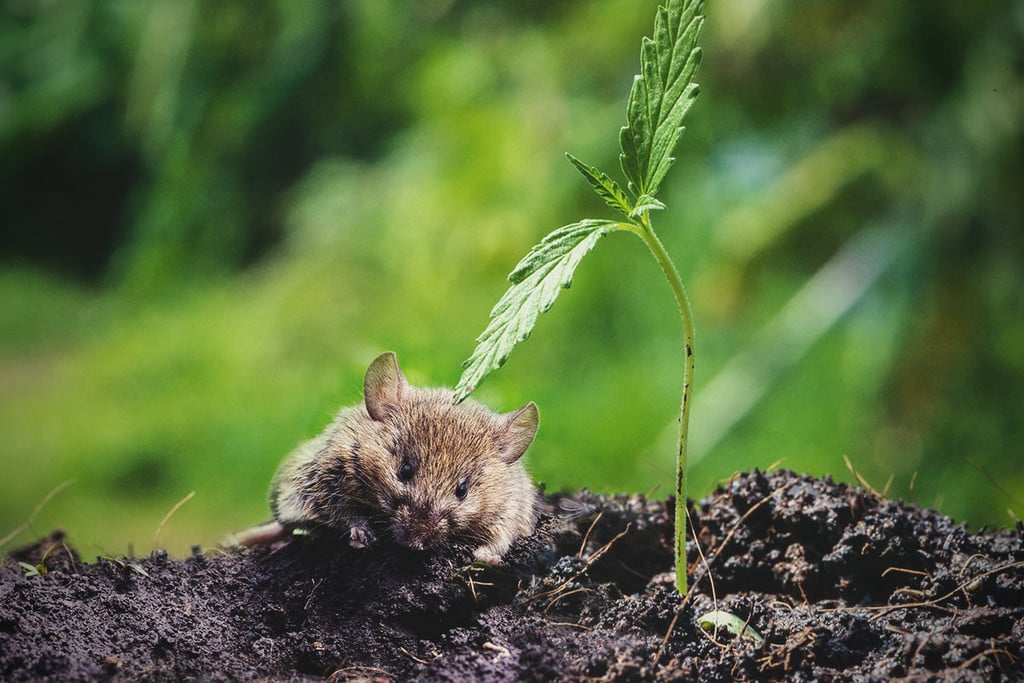.

How To Keep Deer Out Of Your Cannabis Garden
Deer like leaves, including those of your beloved cannabis plants. If you grow in an area with deer present, you'll probably want to protect your weed plants from being scoffed away by these four-legged creatures. Find out how to deter them below.
Do deer eat cannabis plants? Good question. The short answer: yes!
Deer can do fairly serious damage to weed plants if they are not stopped. Perhaps you're wondering whether deer even get high from eating cannabis? This doesn't seem to be the case, but they do get satisfyingly full regardless. In this article, we will look at deer deterrents, so that you can protect your plants from these agile mammals.
Contents:
- Deer as garden pests
- How to spot deer in your marijuana garden
- Can cannabis plants protect themselves from deer?
- What types of deer should weed growers know about?
- Using fences to keep deer away from weed plants
- How to keep deer out of cannabis gardens without a fence
- Will cannabis plants recover from deer damage?
- Deer: an overlooked pest in cannabis cultivation
Deer As Garden Pests
For the vast majority of growers, or with the vast majority of growing areas, deer won't be a threat to cannabis plants simply because the deer can't get to the plants. But for the small minority of growers for whom they are problematic, they can be really quite damaging for your lovely cannabis plants.
These beautiful mammals rove about in groups. For most species, these groups will consist of around two to five individuals. Certain species, such as red deer, move in much larger herds, but it's unlikely one of these would be wandering into your garden.
Each deer eats up to 8% of its body weight daily in low-fibre, high-protein plant life—mostly leaves. Now, consider the weight of leaves and that even the smallest deer can be fairly heavy—you've probably gathered: they eat a lot of leaves each day! And if you have several deer moving around together, they will make swift work of many plants.

What Garden Plants Do Deer Eat
Deer are versatile herbivores, and will consume all sorts of leafy greens. They are highly adapted mammals that live across most of the world, and as such they can survive on a very wide range of food sources. For example, muntjac deer are native to Asia, but thrive across Europe nowadays.
Now, it probably won't surprise you that luscious garden plants make a perfect food source for most species of deer. If you grow a wide range of plants and vegetables, these could make an irresistible food platter for our four-legged friends, and they might tempt those lovely animals into your garden.
Deer will take what they can get but mostly prefer young shoots and plants, which are more tender and less bitter than older growth—yum! Particular favorites for deer include:
- Lettuce
- Grapes
- Spinach
- Beans
- Peas
- Cabbage
- Broccoli
- Beets
- Sweetcorn
- Carrot tops
Do Deer Eat Cannabis?
Yes, they do—deer will eat your cannabis, too. Specifically, they will target younger plants, younger leaves, and young bud. Older woody plants with thick stems will be less tempting to them, and the same goes for matured, smelly and resinous buds.
Your plants are at most peril when they are young and when they first enter the flowering phase. Deer will love them at those lively stages!
How To Spot Deer In Your Marijuana Garden
Despite their considerable size, deers are masters of subtlety—if you've ever seen one, just think of how quick, gentle, and quiet their movements are. If these creatures want to stay hidden, they’re incredibly difficult to spot. That being said, if they feel comfortable, then they will graze quite freely and openly.
The most common times to spot deer are at dawn and dusk. During the daytime, they lie low or frequent less inhabited places than gardens. So, if you want to spot them, the best chance to see them is to get up early, or quietly observe the garden during the evening. If you spot them and they don’t spot you, then you’re in for a treat. The animals, especially when they feel calm, are really special for the modern human to see—try not to see the enemy in them, but enjoy watching them for a while if you can.
Deer also leave fairly tell-tale droppings. If you know what sheep poo looks like, then this is probably the closest comparison with deer poo. If they spend much time in your garden, then they will probably leave something behind.
If you find that your leaves are being stripped away, but you can’t figure out why, then you could also invest in wildlife cameras, which are triggered by movement. Not only will these help you discover what’s eating your cannabis plants, but will also give you greater insight into your garden’s ecosystem. When you don't need them for your garden anymore, you could install them somewhere else, at an interesting spot in the woods for example.
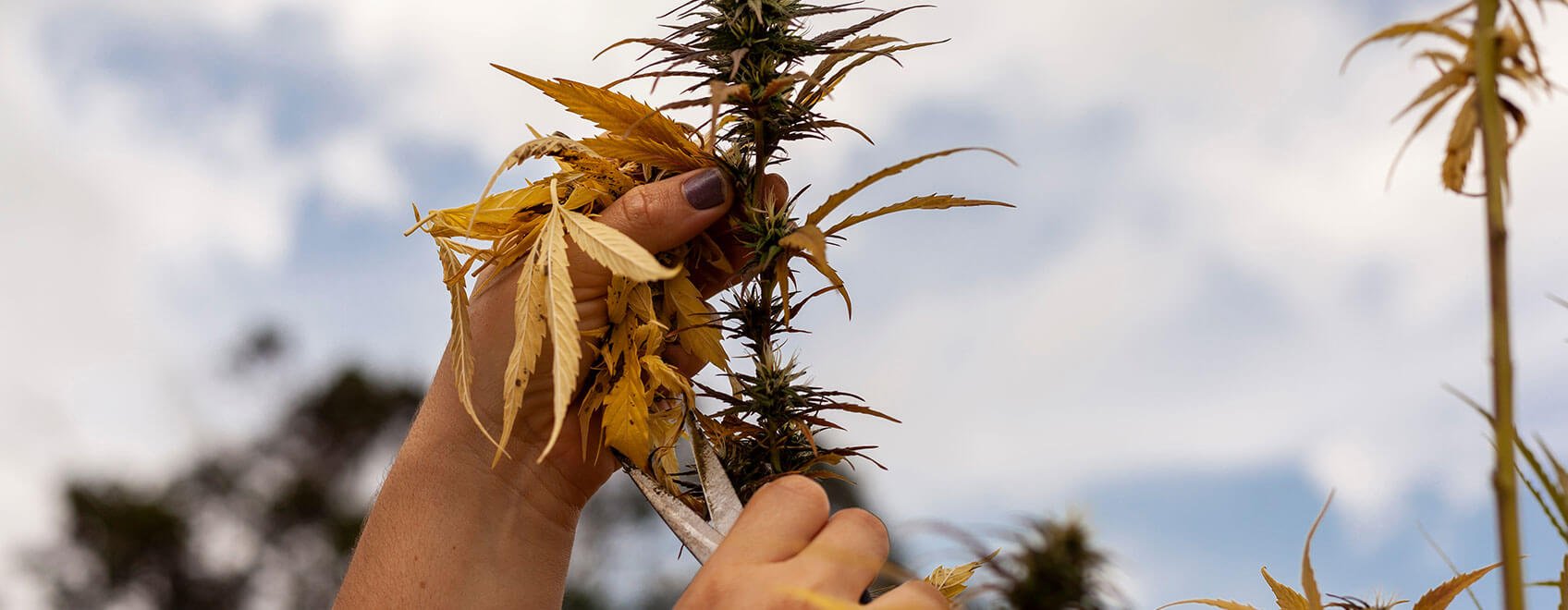
Signs of Deer Damage on Weed Plants
But before you start hiding out and looking for deer, how can you tell if the damage to your plants is the result of deer, instead of something else?
Here are a few signs to look out for:
- Whole buds and leaves missing: deer are hungry and have pretty big mouths. They won’t nibble the corners off leaves and buds, but will rather bite large chunks out of them, or strip parts off in their entirety.
- Bite marks on leaves: if the whole leaf isn’t missing, deer will leave pretty obvious bite marks. In these marks, you’ll be able to see the outline of teeth.
- Changes in plants overnight: as they eat a lot and move in groups, the effects of deer binging on your plants won't be gradual! You might wake up one morning to find a lot of damage—even everything stripped in one fell swoop.
- Seedlings missing: if you’ve put young plants out, deer can come and eat these in a matter of moments.
Can Cannabis Plants Protect Themselves From Deer?
Why does cannabis smell so strong and get you high? As much as it may seem that it’s nature’s gift to humanity, it’s more likely a set of defense mechanisms to prevent predators, such as deer, from eating it.
The pungent aroma given off by cannabis is one of its methods to deter those which may otherwise do it harm. As is THC. Ironically, these have made this plant a prime candidate for human bondage!
If they detect they are being eaten, cannabis plants will react, and they can even signal to plants in the surrounding area to do the same. But while this deterrence has some effect, you can imagine that it won’t fully protect your plants if deer are regular visitors to your garden.
What Types of Deer Should Weed Growers Know About?
Depending on where you live, you’ll have different types of deer to contend with. Here’s an inexhaustive list:
- Axis: otherwise known as cheetah deer, for most of our readers, this kind of deer shouldn’t be an issue. Native to India, they have also been introduced to an island off the coast of Croatia, Australia, Hawaii and Texas.
- Brocket: Similarly, brocket deer probably won’t cause an issue for most of the people reading this. They are native to the forest of Central and South America, and haven’t really spread.
- Muntjac: these deer are natives of South East Asia, from Vietnam to the Himalayas. However, there are also found across the UK, where they have adapted to life with surprising ease. These are small deer and can easily slip into a garden.
- Elk: these are the largest species of deer, and are common across North America and East Asia. In Northern Europe, populations can also be found. Generally, these large animals are probably not the most obvious candidates for eating your garden.
- Fallow: fallow deer are common across Europe and a little of the Middle East. These creatures live in fairly large herds and are quite big themselves. They have dappled patterning, which makes them distinctive.
- Moose: these are members of the elk family and are very large, too. They native to North America, Northern Europe and Northern Asia, and tend to live along the latitude of the Boreal forest.
- Mule: these are named after their large, mule-like ears. They are native to the Western united states and they are of medium size.
- Red: these are a large species of deer native to Europe, North Africa and the Middle East. They generally roam around in large herds, and the males are famous for rutting (fighting) in the Fall.
- Roe: this is a smaller species of deer native to Europe and the Middle East. They live in small herds and are quite flighty. Nevertheless, they are very common and can be found living in even rather urban environments.
- White tail: the white tail dear lives across the Americas; they can be found as far North as Canada and as far south as Peru and Bolivia.
You might be wondering what the difference between deer and venison is. Well, here is your answer: deer is the name of the animal, and venison is the name of the meat. Think of the difference between cows and beef.
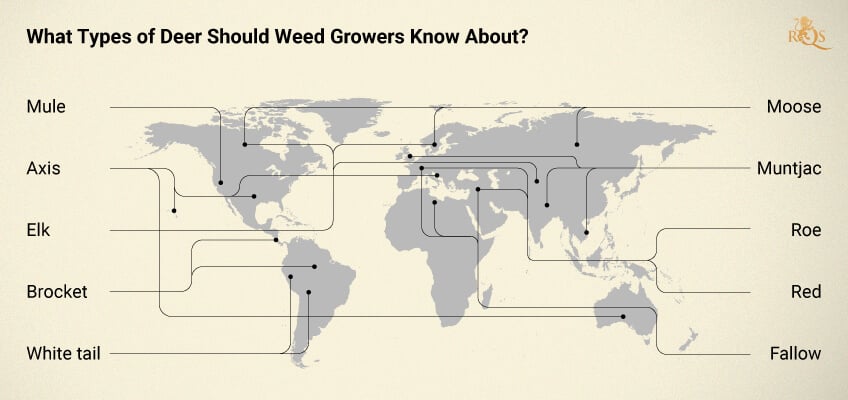
.jpg)
Using Fences To Keep Deer Away From Weed Plants
If you’ve got a precious garden and you want to keep deer from eating it, then you might consider erecting fences around the most precious parts. One thing to note is that deer are very agile and can easily hop over most fences. So if you really want to keep them out, you’ll have to mean it.
Note that there are already many fences in the world, and they don’t just stop deer from moving around through nature. If you put up a fence around your garden, you’ll be disrupting a whole ecosystem, so really do think twice before you do it.
Types of Fences to Protect Cannabis From Deer
There are several different types of fence you could use to deter deer. Whichever you go for, ensure that they’re high enough. A cute little 1 metre fence won’t do anything, believe us.
- Chain link: these are pretty standard and you’ll find them all over the place. While they can be effective against deer if they are tall enough, they’re not very attractive and will just block the very smallest life from moving in or out of your garden.
- Wire electric: you could also use an electrified fence. The benefit of these is that you can erect temporary ones just around your cannabis grow, and remove them afterwards. This means that you don’t need to commit to permanently fencing in your garden, which would be lovely for that ecosystem.
- Barbed wire: barbed wire is more designed to deter humans from climbing over fences than it is effective and stopping animals.
- Polypropylene: essentially, these are plastic fences. They’re not very attractive at all, but they’re cheap and they’re quite easy to dismantle, so they don’t necessarily need to be permanent. However, you could reuse them later.
- Wooden slats: wooden slats are an effective, permanent solution for fencing a garden. They can be quite high, and should keep out deer successfully. They are also opaque, meaning your garden will be closed off from the rest of the world—a feature you might desire when growing cannabis.
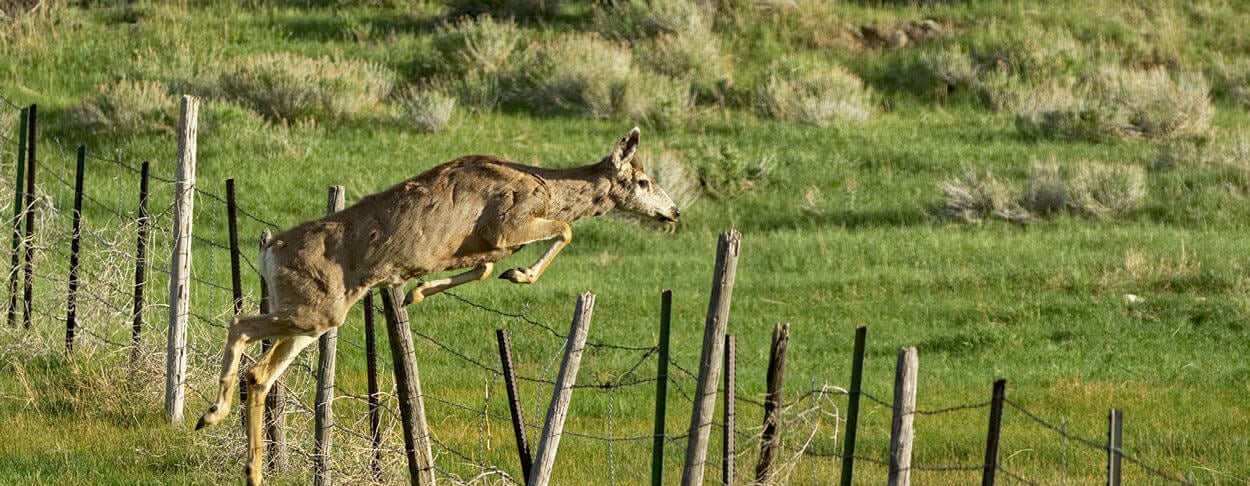
Pros of Using Fences To Keep Deer Away From Weed Plants
- A tall enough fence can be effective to reach your goal
- Electric fences can be used just around the necessary parts of the garden, and then removed, meaning they are the least disruptive
- Some can be quite cheap
- They will also deter certain other animals that could pose a threat to your plants
Cons of Using Fences to Keep Deer Away From Weed Plants
- Fences can be expensive to install
- They can disrupt and properly damage ecosystems
- To be effective at stopping deer, they need to be at least two metres tall
- They can be quite ugly
How To Keep Deer Out of Cannabis Gardens Without A Fence
What might be better than putting up a fence is using certain other deterrents against deer. These can be low cost, and are less disruptive, hence better for the environment. Let's have a look.
- Creosote
- It might be a myth, but some gardeners claim that creosote rags deter deer. Others, however, claim it is ineffective. Also, depending on where you live, creosote can be difficult to get hold of. So, maybe try something else.
- Human Hair
- Unwashed human hair, hung in muslin bags or a pair of tights at the deer’s head height can be quite effective to deter deer. Sounds like witchcraft? Well, it's not! Deer have a highly developed sense of smell and are rightly terrified of humans. If they catch a whiff of hair, they tend to avoid it. Smart creatures!
The human hair should be replaced at least once a month, and rain can reduce the efficacy of this method, so you might want to swap the pack after a stormy night. - Human Urine
- What goes for human hair also applies to human urine. Mark your territory! Urinate around (but maybe not onto) your cannabis plants with frequency, and it might keep the deer away.
- Scented Soap
- Again, reports give mixed ideas on success, but fragrant soap hung at deer head height might help to deter them. A benefit of soap is that it is effective until it has all dissolved, so rain etc. won't be an issue. If you choose this option, consider using organic soap.
- Mothballs
- Apparently, mothballs are totally ineffective at deterring deer, even though some purport to use them. Good, we discussed it, though!
Will Cannabis Plants Recover From Deer Damage?
It really depends on the extent of things. A little nibbling shouldn’t cause too much damage. A lot of nibbling might reduce growth and the final yield, but shouldn’t spell the end of the world anyway.
If the deer strip the entire plant though, or damage the main stem, then it might be game over. Also, if deer go for the buds once the plant has started flowering, it'll be much more difficult for the plant to regenerate.
How to Help Weed Plants Recover From Deer Damage
If the damage seems manageable, then you need to give your darling plants some extra love to help them recover. Plants, especially when they are still vegetative, can recover, even from quite severe damage. To help plants recover, you can:
- Water well (but not too much!)
- Increase nutrients for a small period
- Add molasses to the soil to give the plants extra sugar (which they will struggle to produce without leaves)
- Support the plants with trellises or stakes
Deer: An Overlooked Pest In Cannabis Cultivation
In most cases, deer won’t present an issue to your cannabis grow. When they do, though, the damage can be rather significant. These animals are shy and will run a mile if they detect humans, so it should be easy to keep away from your garden without putting up fences. They'll find their leaves elsewhere. You need to make your presence felt or smelled. And if you can’t keep them away, just enjoy these beautiful animals as much as you can—they're astonishing creatures, and seeing them is a rare treat.



























